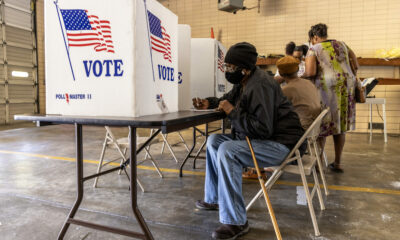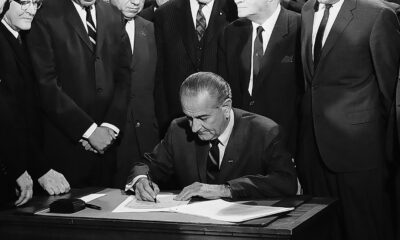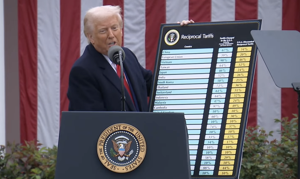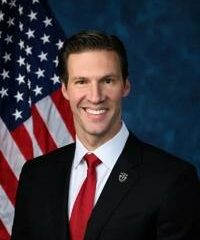Mississippi Today
A look at what Blue Cross reimburses UMMC, both before and after the contract dispute

Blue Cross and Blue Shield of Mississippi and the University of Mississippi Medical Center went head to head for months last year over reimbursement rates.
Turns out, it wasn’t for nothing.
An analysis by Mississippi Today and The Hilltop Institute at the University of Maryland, Baltimore County shows that in March 2022, during the throes of the dispute, Blue Cross’ negotiated rates were largely lower than other major private insurance companies — Aetna, Cigna, Humana and United — for several common procedures. This was especially true for more expensive procedures and emergency room visits.
A negotiated rate is how much an insurer has agreed to pay an in-network provider through a plan for covered services.
Hospitals perform and are reimbursed for thousands of procedures each year, but what they charge and what insurers pay has largely been kept a secret — that is, until 2021, when the federal government ordered hospitals to start publishing the data.
Mississippi Today worked with The Hilltop Institute to identify 21 common adult and pediatric procedures, then analyzed what Blue Cross reimbursed the hospital for each of those in March 2022, before the entities entered the contract dispute, and in March 2023, after the two entities renegotiated their contract.
Both Blue Cross and UMMC declined to answer any of Mississippi Today’s questions for this story.
The data show that for the selected services, Blue Cross almost never paid close to what UMMC charged, unless it was for cheaper procedures. The only exam that Blue Cross paid exactly what UMMC charged in 2022 was for a fetal non-stress test, which costs $231. (In 2023, when the cost was raised to $400, Blue Cross’ payment increased to $380.)
Hospital prices as of September 2022 show that in general, commercial negotiated rates are on average around 58% of the hospital charge for a given service, according to Morgan Henderson, principal data scientist at Hilltop.
In 2022, Blue Cross largely paid less than other private insurers for more expensive procedures, though the data shows that these insurance companies generally pay less than what UMMC charges.
According to data over the past three fiscal years from the Center for Healthcare Quality and Payment Reform, UMMC charged four times more for services provided to patients than it cost to deliver those services, which Henderson said was in line with what other hospitals charge.
Hospital charges are arbitrary — they can differ substantially from hospital to hospital. It’s rare that any payer gives hospitals the full amount they charge for any service, according to Harold Miller, CEO of the Center for Healthcare Quality and Payment Reform.
Some key findings from 2022 data show:
- Other insurers paid UMMC $250 for blood tests called total metabolic panels, $151 for comprehensive metabolic panels and $127 for therapeutic exercises. Blue Cross paid $12, $15 and $35, respectively.
- With the exception of X-rays, Blue Cross paid significantly less than other private insurers did for common radiologic procedures.
- Preventative care for kids and other services, such as chest radiologic exams and hospital observations, were more equitable compared to what other insurers paid — but they were all services that cost around or less than $150.
- Blue Cross paid more for vaginal deliveries, C-sections and fetal tests than other companies.
Henderson pointed specifically to Blue Cross’ low reimbursement rates for emergency room visits, one of the more common reasons people visit a hospital.
For the base cost of emergency room visits (not including any other services often charged during ER visits), Blue Cross reimbursed UMMC in March 2022 at far lower rates than other major insurers and what UMMC charges — by thousands.
“In light of this, the fact that BCBS Mississippi pays only $537.38 for a level 5 ED facility fee – for which the charge is almost $4,800 – is especially striking,” Henderson said.
Emergency room visits are categorized, and charged, based on severity. For a mild injury, a patient is charged a base level 1 fee, excluding any tests that might be performed during that visit. The most severe injury constitutes a level 5 emergency room visit.
And as the severity of the emergency room visit goes up, so does the charge. Depending on the level of injury, UMMC can charge anywhere from $468 to $4,796 for an emergency room visit. But for the most severe ER trip, Blue Cross reimbursed UMMC $537, while other insurance companies paid thousands more.
“This is a very good deal for BCBS Mississippi, especially when compared to the negotiated rates that other large commercial insurers pay for this same service,” he said.
As state lawmakers continue not to expand Medicaid, health care administrators across the state report that people who are uninsured and can’t afford preventative care are using the ER more often for general health care needs.
A year later, data from March 2023 shows that payments from Blue Cross for common procedures generally remain lower than other private insurance companies. In some cases, Blue Cross still pays thousands less.
The terms of UMMC’s agreement with Blue Cross, which was decided when the dispute ended in December, have not been disclosed.
Medicare rates are typically used as a gold standard to judge whether insurer payments are too high or too low. While Blue Cross rates are reasonable compared to Medicare payments, they’re still lower than other private insurers.
“I found the (Blue Cross) vs. non-(Blue Cross) price gaps for emergency and some other procedures very large, but in general what you found is expected,” said Ge Bai, a professor of health policy and management at Johns Hopkins Carey Business School, in an email to Mississippi Today.
“Large insurers can flex their muscle on the negotiating table and make threats toward hospitals, such as what (Blue Cross) did last year. Small insurers’ threats won’t be as concerning to hospitals because their beneficiaries do not account for a large portion of the hospital’s patient volume. Therefore, small insurers’ negotiated prices can be relatively higher.”
At a market share of 55%, Blue Cross insures the majority of Mississippians with private insurance, and UMMC is the state’s largest public hospital.
But according to consumer advocates, insurers with lower negotiated rates are supposed to pass those savings on to consumers in the form of low premiums, and if a for-profit company has a big surplus, larger premiums shouldn’t be necessary.
However, that doesn’t seem to be the case for Blue Cross — at least for the past three years.
Alleging they had to pay more in claims than expected, Blue Cross raised premiums in January 2020 for small business plans and individual plans. Since then, the insurance company has raised rates for individual plans at an average of 18% and small group plans at an average of 15.6%, according to data from 2023.
After UMMC asked Blue Cross for substantially increased reimbursement rates last year and Blue Cross refused, the hospital system terminated its contract with the insurance company and subsequently went out of network in April. The move forced tens of thousands of Mississippians to pay significantly more or go elsewhere for health care, including for some services that are only available at one place in Mississippi: UMMC.
UMMC houses the state’s only Level 1 trauma center, Level IV neonatal intensive care unit and children’s hospital. It is also home to the state’s only organ transplant center, where transplant candidates with Blue Cross insurance were marked as “inactive” on the wait lists when the hospital was out of network with the insurer.
During the dispute, UMMC maintained that it was asking for below-market rates for academic medical centers, while Blue Cross officials said to increase reimbursement rates, Mississippians’ premiums would have to go up.
A Mississippi Today investigation found that Blue Cross was sitting on a huge reserve of money, to the tune of $750 million.
While insurers generally try to hold at least three times as much capital as the minimum requirement — a ratio of 300% — to ensure the company can pay out claims, Blue Cross’ ratio has been around 1,600% for years, financial records revealed. It’s significantly larger than Blue Cross peers in neighboring states, and perhaps the largest such surplus by percentage in the country.
State Insurance Commissioner Mike Chaney said it was UMMC’s goal during the dispute to get closer to a 160 to 170% reimbursement rate from Blue Cross compared to Medicare.
Chaney, who advocated on behalf of consumers during the dispute between Blue Cross and UMMC, has long complained about the difficulties in regulating insurance reimbursement rates. He has previously said that Blue Cross won’t make that data available to his office.
New health care price transparency rules, which went into effect in 2021, requires hospitals and insurers to publish their rates, but that doesn’t mean those numbers are easy to access. They’re published on an individual basis, hospital by hospital, and the files, which don’t always look the same, are huge and sometimes hard to decipher.
Gov. Tate Reeves axed a bill earlier this year that would have allowed Chaney’s office the authority to study and address inequalities in reimbursement rates among insurance companies. The bill, which Reeves called a “bad idea,” would have allowed the commissioner to fine companies thousands per violation if they can’t justify unequal reimbursement rates for different hospitals for the same procedures.
“Transparency should provide policy-makers an understanding of what is contributing to the critical financial issues hospitals, clinics, and health providers are facing,” said Mitchell Adcock, executive director of the Center for Mississippi Health Policy. “If payments are not equitable, there are no other financial sources that provide enough revenue to cover health providers' costs.”
And as state leaders continue to oppose expanding Medicaid to the working poor, providers rely on private insurance company payments to offset uncompensated care for people who are uninsured.
Uncompensated care and higher health care costs have worsened the state’s hospital crisis. A third of rural hospitals in Mississippi are at risk of closure.
“The current hospital revenue model, good or bad, is private insurance payments to help cover the limited payments from Medicare and Medicaid and help offset some of the uncompensated care cost,” Adcock said. “Therefore, private insurance payment rates have a significant impact on hospitals’ ability to operate.”
This article first appeared on Mississippi Today and is republished here under a Creative Commons license.
Did you miss our previous article...
https://www.biloxinewsevents.com/?p=248805
Mississippi Today
A self-proclaimed ‘loose electron’ journeys through Jackson’s political class
The day after Tim Henderson finished third in Jackson’s mayoral primary, garnering 3,499 votes, the retired Air Force lieutenant colonel was planning to pack up his office at the Jackson Medical Mall and be out by the end of the week.
Henderson figured that’s what losing candidates do. Then he said his older brother gave him a different perspective: Henderson had just established a base of people who had rejected the city’s status quo, and he shouldn’t let them down.
“That’s what happens all the time,” Henderson said. “Candidates show up, they don’t win, the stuff they talked about doing, they walk away, and they leave the people hanging, which is partly, probably why people have lost faith in the process.”
As the 54-year-old space industry consultant spoke with friends, family and politicos last week, he began to look at those 3,499 votes differently. Instead of an outright loss, the numbers seemed to represent something remarkable: In a city where name recognition is king, it took less than a year for Henderson to go from a name few knew to finishing just 786 votes shy of the incumbent, Mayor Chokwe Antar Lumumba.
He did it with a handful of volunteers and few connections to the city’s powerbrokers or politically connected church leaders or nonprofits. In fact, Henderson thinks his relatively little clout is precisely why he did so well.
“People insulate themselves inside of certain circles, and the problem a lot of people have with Henderson is I wasn’t connected or associated with any of those cliques,” he said. “People immediately started asking, who knows him?”
Now, Henderson is contemplating what he’s going to do next.
“I can be the mayor of the city hall, or I can be the mayor out here on the streets,” he said.
Beholden mainly to God and the truth, he said, he’s ready to talk – with little filter – about what Jackson needs to anyone who wants to listen. He described himself as “a loose neutron, or a loose electron, free radical.”
“Not radical in the sense of ‘radical’ but somebody that doesn’t have to be guarded in how I do things,” he said, adding, “Now I can say things other people can’t say and I can represent things the right way.”
He’s not sure he’ll endorse anyone. Henderson said that in the past week, he’s met with the Lumumba campaign, as well as state Sen. John Horhn, whose 12,359 votes nearly preempted a runoff. To win the Democratic nomination outright, Horhn would have had to secure around 500 of the votes Henderson or 10 other candidates received.
Both asked what their campaigns needed to do to get Henderson’s support. He says he told them the same thing: Start an Office of Ethics and Accountability, one of his chief campaign goals.
He wouldn’t say which candidate said what. But one told him they weren’t sure the city had the funding for it. He recalled the other asked if Henderson would work with them if they started an Office of Integrity, to which Henderson responded “only by my rules.”
Through a spokesperson, Horhn said he wants to bring more accountability to the city’s procurement process and that his ongoing discussions with Henderson have been “productive.”
Horhn has been a senator representing parts of Jackson since the 1990s, and Lumumba is finishing his second term as mayor. If nothing has changed in the city in the last eight, or 32, years, Henderson reasons that’s because the people with power and connections, including those behind the scenes, don’t want change.
When Henderson moved back to the city two years ago, the Cleveland, Miss. native and Mississippi Valley State University graduate moved in with his brother, who lives in south Jackson.
The retired military man had two goals in mind: Develop the vacant lots he owns near the Westside Community Center — a neighborhood called “the Sub” — and start a gourmet grocery store in downtown Jackson, hopefully on the first floor of the Lamar Life building owned by longtime downtown Jackson developer Andrew Mattiace.
Henderson said he couldn’t find the funding – a common refrain in Jackson – or secure meetings with folks who might provide the funding. Still, his business endeavors bore political fruit as he met people he said encouraged him to run for mayor. That included Robert Gibbs, an attorney and developer who was working to convene a group of community and business leaders to secure a new city leader. The coalition assumed the name Rethink Jackson.
Last year, Gibbs invited Henderson to meet with Rethink Jackson members and others at the Capital Club, a highrise bar owned by Mattiace. The group was looking for a candidate to support, but Henderson recalled that Gibbs told him the meeting was not “an endorsement.”
But when Henderson arrived, he says they kept him waiting in the lobby for 30 minutes before finally calling him up to meet with the dozen or so people in the room – mostly African American leaders – who were sitting at tables around the bar.
Gibbs was there, so were Mattiace and Jeff Good, a local restauranteur.
“Before we move forward, I want to make sure the air is clear: This is not an endorsement,” Henderson recalled telling the room. “And they’re like no, nope, it’s not an endorsement. I say well let me be clear you may not hear what you want to hear this evening. I’m only going to share what I’m comfortable sharing, because what I’m not going to do is have my information travel all across the city. Is that fair? That is fair, right? OK, so let’s talk.”
When the group asked about economic development, Henderson said he brought up the Capitol Police, saying “I don’t care how much police security you put down here, you gotta put something in the parts of the city where people live,” meaning both safety and opportunity in west and south Jackson.
“They can only rob other poor people so much,” Henderson said, to which he recalled the folks in the room “just looked at me.”
Mattiace said he preferred not to comment on the election so he could remain neutral for the sake of his business. Good said he did not have a good memory of the meeting but added he thinks Henderson is a “good guy” and that’s why he did well at the polls.
Gibbs didn’t comment on the meeting but said he’s heavily involved in the Horhn campaign and doesn’t want to hurt it. He did speak to Rethink Jackson as a coalition, adding that the group also met with Horhn, Delano Funches, and Rodney DePriest, an independent, “to identify the person we felt would be the best person to lead the city of Jackson.”
After meeting with him, Henderson said he told one of the folks that he wouldn’t be back – he had a campaign to run. He didn’t hear from the group again.
Rethink Jackson debated and took a vote on which candidates “could come in on day one and start doing the things we felt the city needed in order to turn around,” Gibbs said.
“We had a vote, paper ballot voting, that we took so that people could not necessarily be influenced by someone who was in the room,” he added.
Out of about 50 people, Gibbs said only one person was unsure of Horhn. The endorsement was a campaign score for the senator.
It wasn’t just the business community Henderson says did not ultimately align with his campaign. When he talks about the status quo he wants to undo, he means nonprofits, too.
On the campaign trail, Henderson committed to personally screening all nonprofits that receive city grant funds. He wanted to send out screening criteria, categorize all the buckets of grant funding the city was dispersing, and meet with each nonprofit. But if they didn’t show up, he said he would contact their other funders.
He called this “a dogwhistle” – a tell that he was on to them.
“You’re using my data,” he said. “As the mayor, it’s my data. And if you’re supposed to be working in this city, I want to know outcomes.”
Jackson has an excess of nonprofits, Henderson said, that are all working to tackle similar social ills, from decreasing homelessness and youth violence to improving mental health. Some are doing good work and should be supported to leverage their resources. But for others, those missions are a “smokescreen,” Henderson said, and the problems remain. Coincidentally, this is a similar campaign pillar of conservative talk radio host and independent mayoral candidate Kim Wade.
“Here’s my concern: Things aren’t getting better because people don’t want them to get better,” Henderson said. “If you keep crime high, poverty high, you keep the education system where it is, you keep housing, the lack of affordable housing high, you keep jobs at the minimum wage – the only thing people have as an entry point, there’s no upward mobility. This city will never be what it can be. … Because if you wanted change, you’d work yourself out of a job.”
Within city hall, Henderson said he wanted to “clear the slate” by rehiring every department head, putting out job descriptions, and hiring candidates with a blind application – no names, race or gender attached – to ensure that a person’s “connections” were not taken into account.
“Those connections over time is why we are the way we are,” he said. “Because the most qualified person is not who you’re hiring. You’re hiring someone connected to you.”
Make no mistake: Henderson made connections, too. He said two names include Shirlene Anderson, a former chief of police under Frank Melton, and Hank Anderson, a retired administrator for IBM who worked in former governor Ray Mabus’s administration. Anderson had approached Henderson after the February debate at Duling Hall and later advised him on how to keep his message straight.
After that, Henderson made a point to answer questions as directly as he could during the candidate forums. He said he stressed: “public safety, cleaning it up, public safety, cleaning it up.”

“Everybody else is talking about economic development and all this other stuff,” he said. “I’m like, either you don’t know what you’re talking about, or you’re playing the people, or it’s both. I’m like no, you can’t get any economic development with crime the way it is.”
But perhaps the most important connection Henderson made during his run for office was with Sherri Jones, the first person to join the campaign and the station manager at WMPR.
The pair formed a kinship over their deep skepticism of the city’s elite — Black and white, activists and church leaders, and especially the politicians and the business owners who seem to be looking out for their bottom line and not for the entire community.
“You got two things you gone have to be aware of,” Jones said. “One is racism. The other is classism. Now, when you deal with the classicism, it’s about a certain group of people and a lot of them are African American and then they are connected with white people and they don’t really care if there’s racism involved or not because they got a certain agenda and it’s gonna always come back and be tied to money.”
From the perspective of the leaders at the Capital Club, the business community wants to help Jackson, so finding a mayor who works with them will result in economic advancement across the city.
Jones saw it differently.
“It’s about contracts, it’s about being in charge of the decision, what’s going to stay open, what’s going to close, how things move,” Jones said.
Nothing will change in Jackson if economic development does not include the entire city, Henderson said. South and west, too.
The primary “wasn’t just about low voter turnout,” he said. “It actually speaks to the psychological impact that the environment and the quality of life has had on people, where they totally felt dejected, rejected and disconnected.”
What he wants most of all is to bring back people’s confidence in Jackson and knows it won’t happen overnight.
“It’s about empowering the people in the city to be able to believe in it again,” Henderson said.
How’s he going to do that? He might start a nonprofit.
Editor’s note: Mississippi Today is moving this summer into the Lamar Life Building, operated by Andrew Mattiace, in downtown Jackson.
This article first appeared on Mississippi Today and is republished here under a Creative Commons Attribution-NoDerivatives 4.0 International License.![]()
Mississippi Today
Voters can help maintain city of progress in upcoming Jackson election
Editor’s note: This essay is part of Mississippi Today Ideas, a platform for thoughtful Mississippians to share fact-based ideas about our state’s past, present and future. You can read more about the section here.
As Jackson’s mayoral race moves into the April 22 runoff, the future of our city hangs in the balance.
This election is not just about who will sit in City Hall. It is about the direction of our city for years to come. Jackson is at a crossroads, and the choice we make in this runoff will determine whether we continue our journey toward progress or allow the weight of past challenges to slow us down. The outcome of this election will send a message about what kind of city we want to be.
Do we want leadership that is forward-thinking, accountable and committed to real solutions? Or will we settle for leadership that is reactive rather than proactive? The people of Jackson deserve a leader who understands that governance is about service, not status. This is a defining moment. It is a moment that will test our commitment to progress, our ability to persevere and the power of our collective voice.
Our voices will be heard through our vote.
A city of progress
Despite its struggles, Jackson has always been a city of progress. Our history is filled with moments of resilience, innovation and growth. From the Civil Rights movement to economic revitalization efforts, Jacksonians have always been visionaries who believe in creating a better tomorrow. Even in the face of difficulties, our people continue to push forward.
Over the past few years, we have seen improvements in economic development, in efforts to enhance infrastructure and in a growing emphasis on education and community engagement. But we cannot afford to be complacent. Progress does not happen automatically. Progress requires leadership that listens, adapts, and is willing to make bold decisions for the greater good.
The next mayor of Jackson must not only understand our city’s challenges but be willing to fight for the innovative policies and investments that will strengthen our schools, enhance public safety and expand economic opportunities for all residents. Progress is not just about making promises; it is about taking action.
A city of perseverance
Jackson is no stranger to adversity. From economic setbacks to infrastructure failures, our city has endured its fair share of difficulties. We have faced crises with our water system, budget constraints and rising crime rates, but through it all, the people of Jackson have continued to push forward. Perseverance is part of who we are. It is in our DNA.
Our next mayor must embody that same spirit of perseverance. This is not a position for someone who wants the title without the responsibility. It is not a job
for someone looking for an easy win or political gain. We need a leader who understands that real change requires commitment, hard work and the ability to navigate complex challenges with determination and integrity.
Leadership in Jackson requires someone who will not back down when things get tough. We need a mayor who will fight for solutions, not excuses—who will prioritize action over rhetoric. The people of Jackson deserve leadership that is as resilient as they are.
A city of power
Jackson’s greatest strength is its people. We are a city of educators, entrepreneurs, activists and students —each playing a vital role in shaping our community. Our collective voice has the power to drive change and that power must be reflected in the leadership we choose.
The power of Jackson lies in its communities. From West Jackson to Fondren, from South Jackson to Belhaven, every neighborhood has a voice and a vision for a better city. But for our collective power to be effective, we need leadership that empowers its people. The next mayor of Jackson must be someone who recognizes the importance of investing in our communities, supporting local businesses and uplifting young people who are the future of this city.
This election is an opportunity for Jacksonians to demand bold, transformative leadership. We need someone who is ready to challenge outdated systems, push for new economic opportunities and build a city that is safe, inclusive and thriving.
Our power is in our vote, our voices and our vision for what Jackson can and should be. But power is only meaningful if we use it. If we want to see change, we must show up to the polls on April 22 and make our voices heard.
The choice before us
As we head to the polls, we must ask ourselves some critical questions:
- Who has the vision to lead Jackson into a new era of progress?
- Who has the perseverance to take on our toughest challenges and see them through?
- Who has the power—and the will—to bring our city together and create meaningful change?
These questions are not just theoretical. They will define the future of Jackson. This is not just another election; it is a pivotal moment for our city. The choice we make will impact our schools, our economy, our infrastructure and the safety of our neighborhoods.
We owe it to ourselves, our families and future generations to make the right decision. This is our city, and it is up to us to ensure that it thrives. Leadership matters. Policies matter. And most importantly, our participation in this election matters.
Conclusion
Jackson is a city of progress. A city of perseverance. A city of power. But to fully realize our potential, we need leadership that is committed to action, not just words. The April 22 runoff is our chance to shape the future of Jackson for the better.
Our best days are still ahead—but only if we make the right choice at the ballot box. The power is in our hands. Let’s use it.
Javion Shed is the senior class vice president of Murrah High School, the 2nd Battalion JROTC command sergeant major and a Youth Leadership Greater Jackson member. He is committed to creating a stronger future for the city. He believes participating in the democratic process by voting is essential to the future of Jackson.
This article first appeared on Mississippi Today and is republished here under a Creative Commons Attribution-NoDerivatives 4.0 International License.![]()
Mississippi Today
On this day in 1968, Lyndon Johnson signed Civil Rights Act
April 11, 1968

A week after the assassination of Martin Luther King Jr., President Lyndon Johnson signed the Civil Rights Act of 1968, which paved the way for federal prosecution if someone “willingly injures, intimidates or interferes with another person, or attempts to do so, by force because of the other person’s race, color, religion or national origin” because that person was attending school, patronizing a public place, applying for a job, acting as a juror or voting.
The new law granted Native Americans full access to the rights established in the U.S. Constitution. It also included the Fair Housing Act, which barred racial discrimination in the sale, rental or leasing of U.S. housing in the wake of housing protests in Chicago and elsewhere.
This article first appeared on Mississippi Today and is republished here under a Creative Commons Attribution-NoDerivatives 4.0 International License.![]()
-

 The Center Square7 days ago
The Center Square7 days agoCA fails audit of federal programs, 66% of COVID unemployment benefits in question | California
-

 News from the South - Alabama News Feed6 days ago
News from the South - Alabama News Feed6 days ago‘Hands Off!’ Protest Held in Huntsville Saturday | April 5, 2025 | News 19 @ 9 P.M.
-

 News from the South - Florida News Feed7 days ago
News from the South - Florida News Feed7 days agoSouth Florida dad shares update on daughter severely burned in Molotov cocktail attack
-

 News from the South - Alabama News Feed7 days ago
News from the South - Alabama News Feed7 days agoFour people rescued, two taken to hospital after Birmingham apartment fire
-

 News from the South - Virginia News Feed4 days ago
News from the South - Virginia News Feed4 days agoTariffs spark backlash in Virginia over economic impact | Virginia
-

 News from the South - North Carolina News Feed5 days ago
News from the South - North Carolina News Feed5 days agoProposal: American military base retailers would exclude 4 hostile nations | North Carolina
-

 News from the South - Alabama News Feed6 days ago
News from the South - Alabama News Feed6 days agoTrump fires clean energy leader from TVA board without publicly providing a reason
-

 News from the South - Louisiana News Feed4 days ago
News from the South - Louisiana News Feed4 days agoNew Orleans police investigating hit-and-run crash in Seventh Ward; family says grandmother was hurt













































